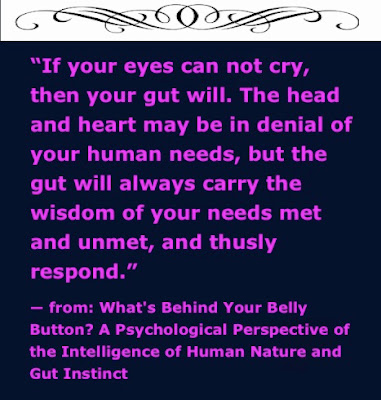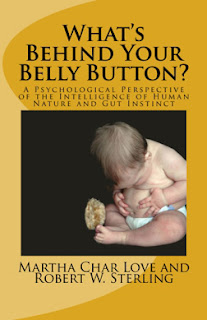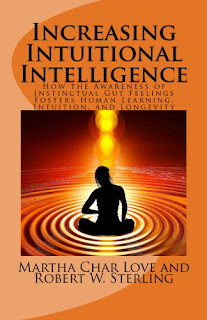Science has shown that elephants do have excellent memories that decode and identify survival skills and imprint important data to be used later when needed. And for the elephant, this memory seems to increase with age and experience, leaving the younger of the herd at risk if the elders are captured or killed by poachers. Let's talk now about how we humans can improve our memory retrieval system through awareness of gut feelings and body-mind unity, a process that can be used at about any age and is one that may certainly increase our health, longevity, and the connection to the awareness of our inner Nature.
So much has been studied recently on memory and aging, on restoring memory and using brain scanning to determine how a variety of modalities to connect body and mind work (for instance meditation and hypnosis) and how they reduce stress. Stress has been found to be one of the main reasons for disease, including alzheimer's, confusion, and loss of memory. Over-secretion of stress hormones may impair long-term delayed recall memory.
For decades we shared our experiences of using the Somatic Reflection Process with hundreds of people in counseling who were experiencing such high stress and confusion that they were having a difficult time making life decisions, particularly concerning career choice and relationships. By centering on the gut feelings of emptiness and fullness (and we are not talking about hunger but instead the feelings that are associated with the two human needs of acceptance and control of one's own responses and the impact of life upon us), and assisting the person to go back in time with their feeling awareness, people were able to be conscious of repressed feelings and examine the impact life had upon them with a clearer view than they did at the time of the actual experience. The gut feeling awareness seems to be the key to our stored feeling memory and most people using the Somatic Reflection Process will remember things they never thought of past the moment of the experience, particularly if it was a traumatic experience or one in which stress was experienced.
And how is this possible that the gut is the key to stored memory? Why is it that by somatically reflecting on the gut response, we can have access to our stored memories? Through electro-chemical communication, neurotransmitters send signals from one neuron to another in your nervous system. One theory is that when we allow ourselves to feel into our gut feelings, we send these signals that restore the synapses in the part of the brain that holds feeling memory. These feeling memories that we have long been suppressing are then called to connect like a magnet to these signals. So when we become aware of gut feelings, we invite hidden memory to emerge to our consciousness, transforming and uniting the body and mind, often for the first time.
And why is it so important to connect the gut and head brains, to restore memories, many of which we may be just as happy not to remember? Why? Because ultimately it is only through this connection of body-mind that we begin to make what is unconscious to become conscious, that we become more self aware, that we find our deepest wisdom and reduce the stress of carrying the burden of misconceptions of who we are and who we are not. And only through understanding ourselves and accepting ourselves can we know and fulfill our instinctive needs that lead us on the path of happiness, fulfillment, and gives us a blueprint for making successful life-decisions.
If you are interested in exploring the use of the Somatic Reflection Process to help you recover memory and for body-mind unity, then we suggest first reading our book What's Behind Your Belly Button? which explains the development and use of the process in detail and also includes a complete protocol for it.
And we cover memory and gut awareness for health throughout our latest book Increasing Intuitional Intelligence. Here below are two excerpts from Increasing Intuitional Intelligence that we think you might enjoy reading:
Gut Feelings As the Key to
Further Development of
Memory
Theories in Psychology
W
|
e are educators and school counselors, not neurologists, and
although we could certainly speculate, we would not presume to say that we know
why in a biological sense that reflecting on gut feelings is key to personal
memory. However, from our extensive counseling experiences with the Somatic Reflection
Process on gut feelings, we have observed that there is a strong psychological
relationship between gut feelings and memory. It is as though reflecting on how
one has felt in their gut in the past, begins to awaken feeling memory in the
majority of people and this triggers even memory of external events or at least
what the person assumed was true at the time of the event. We therefore, feel
from this experience that memory theorists and researchers in the field are amiss
if they do not explore the functional relationship of gut feelings to memory.
Many people say that they cannot remember their childhood
experiences prior to age 7 and memory studies by psychologists in the field of
childhood development will tell you that this is normal. Dr. Patricia Bauer,
Professor of Psychology and Senior Associate Dean of Research at Emory
University in Atlanta, GA, has been researching the development of memory in
children since the 80s. She has found that children begin to have a significant
increase in the rate of forgetting memories of their past life events after the
age of 7, or the onset of what was termed by Sigmund Freud as Childhood
Amnesia.
For a long time, it was thought that the reason many adults
could not remember events from their early childhood was because young children
just did not have memory ability. But that has since been explored in research
and Bauer concludes children do have memory ability but that memories from
earlier than age 7 have an accelerated rate for being forgotten once the child
is past age 7 than the memories formed after that age. Why the onset of this
forgetting process is at age 7 is still in question and has lead to further
important memory studies of children.
What is important here to us is that the memory research now
being conducted on children concludes that recovering childhood memories is
important to the development of personal identity and adult decision-making.
This is a welcome validation of our work developing and using the Somatic
Reflection Process on gut feelings to recover memory, with the affect of
uniting body and mind in consciousness. The importance of recovering childhood
memories is an understanding that we as career counselors have used in our
clinical studies with people since the 70s, as we found that the seeds of who
we are and who we become begin in early childhood. If we can become conscious
of those beginnings, then we have valuable self-awareness information upon
which to base healthy and successful life decisions as adults.
In our counseling work, we found something very shocking to
many people who had no prior or very little childhood memories. When we asked
people to center their awareness on their gut feelings to guide them and slowly
to go back in time and remember when they felt a particular feeling in their
gut before, they would be able nearly 100% of the time to access early
childhood memories previously un-recalled. And those people who had previously
been able to recall childhood memories were able to continue to recall
additional memories using this gut feeling reflection process.
Gut Feelings as the Key to
'Feeling String Theory'
We discovered that the key to recovering childhood memories
was to have people focus on their inner gut feelings and impact of experience
rather than the details of their lives. We would ask them to come in their
awareness to a place in their past when they had the same feeling they were
centering on in the present (usually starting with a reoccurring feeling
connected to an unresolved issue in the present time of their life) and then
they would allow the details of the experience in the past to come to their own
minds. Each time a feeling memory would come up in their consciousness, they
were asked to focus on the feeling and continue to go back further in time. It
was as if their present feeling awareness was attached to a thread that went
all the way back in time to the impact of early childhood. One just had to
follow the feeling and see where it landed. We like to say that our feelings
are like sausages in a string, and that they are similar impacts of events that
are connected. We could call this a feeling
memory string.
Often, the early childhood memory in this feeling memory
string was completely surprising to the person as the details of the event in
childhood would be completely unrelated to the details of the person’s present
life issue that was the trigger of the feelings. But if they focused on the
feelings, it was clear that the issue was the same in childhood as it was in
the present and the person was often still trying to work out this issue in the
present, an issue that began so very long ago.
Using the head brain alone (without gut feelings) to think
back to earlier childhood did not access new memories. But feeling back in
time, particularly centering on gut feelings of emptiness and fullness, would
take people back to feelings in relation to events in their pasts that they had
not previously remembered. This was usually true in each successive session using
the Somatic Reflection Process. The common response after these somatic
reflections was amazement at remembering things they had not previously
remembered and how useful it was in giving them new insights and perspectives
into the present adult issue and decision they may be facing.
How this occurs, that is, how or why neurologically the gut
feeling is the key to recovering memory, we never knew when we first developed
and used the process in the 70s. We just knew that it worked and that it helped
people to resolve issues they had been carrying all their lives and that the
acquired knowledge of self through this somatic process on gut feelings
encouraged positive adult decision-making.
Click on a book cover below to go to Amazon to Buy:
"Increasing Intuitional Intelligence" is also available on Amazon USA and Amazon UK
and it is on The Book Depository with free international shipping.
"Increasing Intuitional Intelligence" is also available on Amazon USA and Amazon UK










